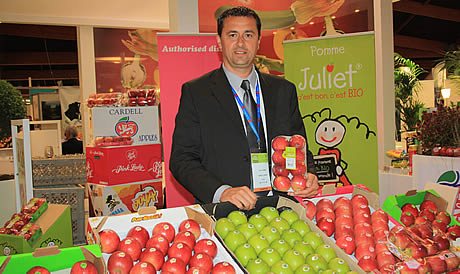 ny Cardell has long been specialised in the production, packaging, distribution and export of French apples. According to salesmanager Pascal Corbel, the season has developed satisfactorily. "We had good volumes, even though calibres were smaller compared to a normal crop. This was due to production levels being quite high, with excessive amounts of fruit in the trees. The most relevant varieties for the company are Pink Lady, Joya and Juliet; premium varieties of which Cardell is marketer and even exclusive distributor for JULIET. "except pink lady, Joya and Juliet are not yet the most important varieties in terms of volume, but compared to regular varieties, for these you get significantly higher prices. We believe it is important for growers to get good prices." Cardell also markets many other varieties, including Royal Gala, Granny Smith, Golden Delicious, braeburn and also Honey Crunch through Pomanjou.
ny Cardell has long been specialised in the production, packaging, distribution and export of French apples. According to salesmanager Pascal Corbel, the season has developed satisfactorily. "We had good volumes, even though calibres were smaller compared to a normal crop. This was due to production levels being quite high, with excessive amounts of fruit in the trees. The most relevant varieties for the company are Pink Lady, Joya and Juliet; premium varieties of which Cardell is marketer and even exclusive distributor for JULIET. "except pink lady, Joya and Juliet are not yet the most important varieties in terms of volume, but compared to regular varieties, for these you get significantly higher prices. We believe it is important for growers to get good prices." Cardell also markets many other varieties, including Royal Gala, Granny Smith, Golden Delicious, braeburn and also Honey Crunch through Pomanjou.Difficult to compete
"Every apple season is different," stressed Pascal. "It is becoming increasingly difficult to compete. Fifteen years ago, selling apples was easier, but now, due to globalisation, we have very tough competitors. This is why the company needs to remain focused and continue to invest. We look for the best nurseries to develop the most attractive varieties. Additionally, we are investing in modern machinery and packing stations. "
Cardell has his own production and markets 50,000 tonnes of fruit per year. According to Pascal, it is always difficult to expand but they are consequently focusing more and more on new markets. "We see opportunities in Europe, Middle East and Asia, since consumption there has still got a lot of potential to grow and they are always looking for good fruit."
Juliet production volumes up
The most characteristic feature of Juliet apples is that it is the only variety in the world whose production is 100% organic. "First we marketed the Juliet only in France, but interest for it grew overseas. Virtually every market is enthusiastic about this organic apple and particularly in France, England, Finland, Germany and overseas with middle east and Asia is there a good demand for Juliet. We currently have 300 hectares for this apple, but not all of them are in full production. Next season we expect 5,000 tonnes, and the season afterwards volumes should increase to 8,000 tonnes.”







